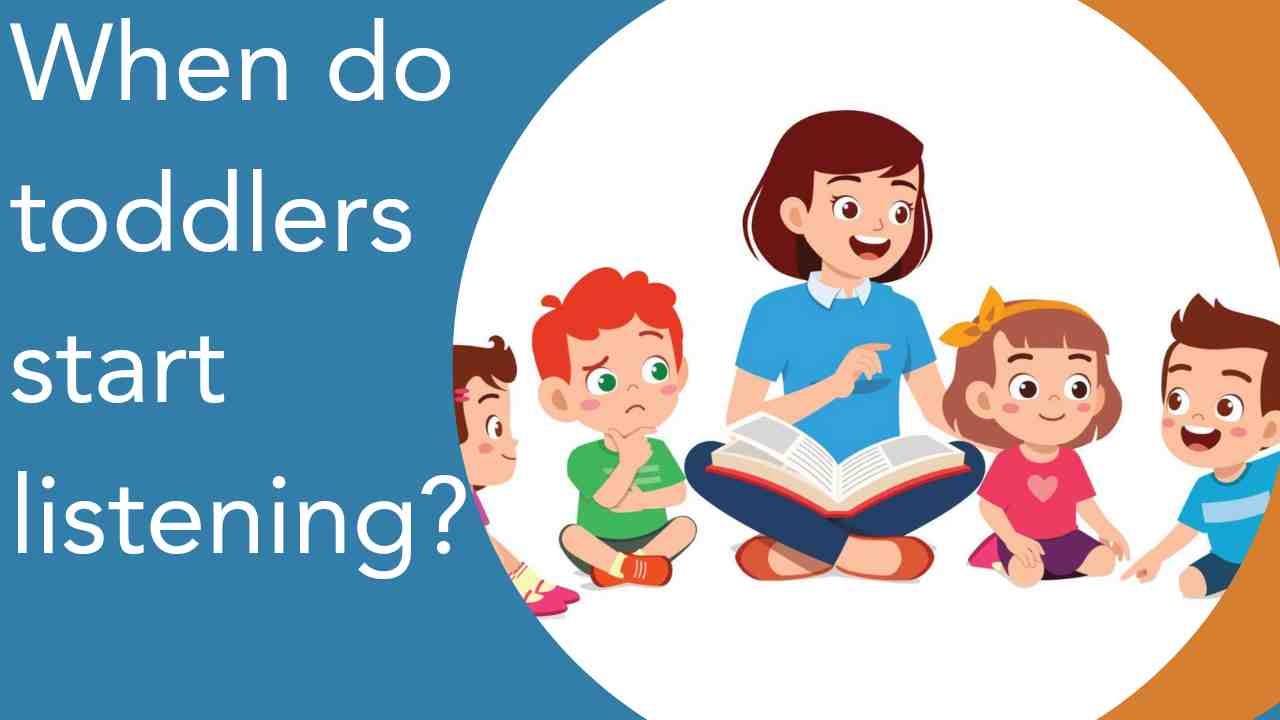As parents and caregivers, one of the most common questions we often ask ourselves is, “When do toddlers start listening?”
When it comes to toddlers, understanding their developmental milestones is crucial for parents and caregivers. One significant aspect is their listening skills, which play a vital role in their communication and learning
In this article, we will discuss the factors that influence a toddler’s ability to listen and offer insights into fostering effective communication during this critical phase of growth.
When Do Toddlers Start Listening?
Toddlers start developing their listening skills from a very early age. As they grow and their cognitive abilities develop, their listening skills become more refined.
General timeline of how listening skills progress in toddlers:
1. 0-3 Months:
Newborns are sensitive to sounds and can respond to loud noises. They may startle or turn their heads towards the source of the sound.
Don’t miss:
2. 4-6 Months:
Infants start to recognize familiar voices and sounds. They may turn their heads and look for the source of voices or react to their name being called.
3. 7-12 Months:
At this stage, babies can understand simple words like “mama” or “dada” and respond to their own name. They also start to respond to simple verbal commands and gestures.
4. 12-18 Months:
Toddlers begin to understand and follow simple instructions, such as “come here” or “give me the toy.” They may also point to objects when asked.
5. 18-24 Months:
Vocabulary expands rapidly during this period, and toddlers can comprehend more complex language. They can follow two-step commands and understand simple questions like “where is the ball?”
6. 2-3 Years:
Language comprehension continues to improve, and toddlers can follow more complex instructions. They also begin to understand basic concepts like colors, shapes, and sizes.
7. 3-4 Years:
Listening skills become more sophisticated, and toddlers can understand and follow longer and more detailed instructions. They also start to engage in conversations, ask questions, and respond appropriately.
It’s important to note that each child develops at their own pace, and individual differences are normal. Encouraging language development through engaging activities, reading, and interactive communication with toddlers can support the growth of their listening skills.
What causes toddlers not to listen?
Several factors can contribute to toddlers not listening effectively. My 2 years old daughter, Amanda displays some common factors that I would like to share.
1. Developmental stage:
Toddlers are still learning to communicate and may struggle to understand or express their needs.
2. Limited Attention Span:
They have short attention spans, so they may get easily distracted, which can be difficult for them to focus on instructions.
3. Curiosity and Exploration:
They are naturally curious and want to explore their environment, which can lead them to disregard instructions.
4. Language Development:
Toddlers are still developing their language skills, sometimes, they may not fully understand or comprehend the language used by adults and she finds it difficult to follow instructions.
5. Independence and Autonomy:
They often want to assert their independence and may resist listening to adults as a way to establish control over their actions.
6. Emotional States:
If Amanda is tired, hungry, or experiencing strong emotions, she becomes less responsive to instructions.
7. Overstimulation:
Toddlers can become overwhelmed in busy or noisy environments and they hardly concentrate on what’s being said.
8. Inconsistency in Discipline:
If you are inconsistent with your disciplinary approaches as a parent, your child may not take your instructions seriously or perceive boundaries clearly.
9. Modeling Behavior:
They may imitate your behavior of adults around them, so if they observe adults not listening, they may do the same.
10. Lack of Empathy:
At times, toddlers may not fully grasp the consequences of not listening, which can affect their responsiveness.
11. Developmental Milestones:
During certain stages of development, toddlers may display defiance as a normal part of growing up.
12. Independence and testing boundaries:
Toddlers may assert their independence by not always complying with instructions or rules.
13. Independence and Curiosity:
They are exploring their newfound independence and curiosity about the world, which can lead them to prioritize their interests over listening to instructions.
14. Strong Emotions:
Toddlers are still learning to regulate their emotions, and when they are upset, frustrated, or tired, it can hinder their ability to listen and respond appropriately.
15. Repetition and Monotony:
They might become desensitized to repetitive commands or routine instructions, leading them to tune out.
16. Engagement in Play:
During playtime, toddlers might become deeply engrossed in their activities, making it challenging to divert their attention towards listening.
18. Physical Discomfort:
If a toddler is feeling unwell or uncomfortable, they may be less inclined to listen to instructions.
19. Distractions:
Usually when children are engaged in an activity, whether watching something, writing, or playing, they are doing so with their full focus. It’s hard for them to listen to you while they’re doing something else.
How do you handle a toddler who doesn’t listen?
Handling a toddler who doesn’t listen can be challenging, but there are some effective parenting strategies you can try:
1. Stay calm and patient:
Keep your emotions in check and avoid reacting with frustration. Toddlers may mirror your emotions, so remaining calm can be helpful. Maintaining your composure sets a positive example for your child.
2. Get down to their level:
Physically squat or kneel to establish eye contact when speaking to your toddler. This helps to establish better communication and engagement. It also helps them feel acknowledged and heard.
3. Use simple language:
Keep instructions clear and straightforward, using short sentences they can understand.
4. Offer choices:
Give them limited options, allowing them to feel some control over the situation. Providing limited options empowers them and reduces resistance. For instance, “Would you like to wear the red or blue shirt?”
5. Use positive reinforcement:
Praise and reward their good behavior to encourage them to listen and follow instructions.
6. Establish routines:
Consistency helps toddlers understand what’s expected of them and make it easier for them to follow instructions
7. Be a role model:
Demonstrate active listening and respectful behavior, as toddlers learn by observing.
8. Set realistic expectations:
They have limited attention spans, so avoid overly long or complicated tasks.
9. Implement consequences:
Use appropriate, logical consequences for not listening, such as time-outs or temporarily taking away a preferred toy.
10. Use Distractions:
If a toddler is refusing to cooperate, try redirecting their attention to a different activity.
11. Time-Outs:
If necessary, use time-outs as a consequence for continuous disobedience. Ensure it’s a safe and quiet space for them to calm down.
12. Identify Triggers:
Observe what triggers disobedience, and try to avoid or address those situations proactively.
How to teach my toddler to listen
Teaching a toddler to listen requires patience, consistency, and positive reinforcement.
1. Clear Communication:
Use simple and age-appropriate language when giving instructions. Maintain eye contact and use a calm tone to get their attention.
2. Lead by Example:
Be a good listener yourself, as toddlers learn by observing and imitating. Show active listening when they talk or ask questions.
3. Engage Their Interest:
Capture their attention by using fun and engaging activities or toys related to the task you want them to focus on.
4. Use Visual Cues:
Combine verbal instructions with visual cues. Incorporate visual aids like gestures, pointing or pictures to reinforce your instructions and make them easier to understand.
5. Be Consistent:
Set clear expectations and follow through with consequences if they don’t listen. Consistency helps them understand the importance of listening.
6. Positive Reinforcement:
Praise and reward your toddler when they follow instructions. Positive reinforcement encourages them to repeat the desired behavior.
7. Keep Instructions Simple:
Give one instruction at a time to avoid overwhelming them and increase the chances of successful compliance.
8. Provide Time and Space:
Give your toddler time to process the instruction and respond. Allow them space to explore and understand what is being asked.
9. Use “I” Statements:
Instead of using commands, frame instructions with “I” statements like, “I need you to put away your toys.”
10. Acknowledge Their Efforts:
If they are making an effort to listen, even if they don’t get it right, acknowledge and appreciate their attempts.
11. Get Down to Their Level:
When you want your toddler to listen, get down to their eye level and speak calmly and clearly. This will help maintain their focus and attention.
12. Use Simple Language:
Keep your instructions or requests simple and clear. Use short sentences that are easy for your toddler to understand.
13. Engaging Activities:
Use games and activities that involve listening skills, such as reading books together, playing “Simon Says,” or musical activities that require listening and following directions.
14. Encourage Active Listening:
Teach your toddler to respond appropriately after you’ve given them an instruction. For example, ask them to repeat what you said or show you that they understand.
15. Patience and Understanding:
Remember that toddlers may get distracted easily or have difficulty processing complex instructions. Be patient and understanding as they learn and develop their listening skills.
How do I get my toddler to listen without yelling?
To encourage your toddler to listen without yelling, try using these positive parenting strategies:
- Use clear and simple instructions.
- Be consistent.
- Praise and reward your toddler when they do listen.
- Give your toddler limited choices to help them feel more in control.
- Keep your voice calm and composed, even if you feel frustrated.
- Get down to their level.
- Acknowledge your toddler’s feelings and thoughts, even if you can’t fulfill their request.
- Stay patient and persistent.
- Use simple and direct language when giving instructions.
- Maintain eye contact.
- Establish clear rules and consequences, so your toddler understands the expectations.
- Show respectful and patient behavior yourself.
When do toddlers start understanding discipline?
Toddlers begin to understand discipline around the age of 18 months to 2 years old. At this stage, they can comprehend simple rules and consequences, though their understanding may be limited.
Consistent and gentle discipline, like time-outs or redirection, can be effective in teaching them appropriate behavior.
As they grow, their ability to grasp discipline concepts improves, and they become more receptive to guidance and boundaries. Remember, patience and positive reinforcement are crucial during this developmental phase.
How do I motivate my child to listen?
Motivating a child to listen requires a combination of effective strategies and communication techniques.
1. Positive Reinforcement:
Praise and reward your child when they listen attentively.
2. Clear Expectations:
Set clear and reasonable expectations for listening. Make sure your child understands what is expected of them.
3. Active Listening:
Be an active listener yourself. Show your child that you value their thoughts and feelings, which encourages them to reciprocate.
4. Engaging Communication:
Make conversations interesting and interactive to keep your child’s attention.
5. Use Visual Aids:
Younger children may benefit from visual cues or charts to follow instructions and tasks.
6. Empathy and Understanding:
Be empathetic and understanding of your child’s feelings and needs. This fosters a trusting relationship and makes them more receptive to listening.
7. Consistency:
Be consistent with your approach to reinforce listening behavior consistently.
8. Avoid Overwhelming:
Avoid giving too many instructions at once; break tasks into manageable steps.
9. Involve Them in Decision-Making:
Involve your child in decision-making whenever possible, giving them a sense of responsibility and importance.
10. Make Listening Fun:
Use games or storytelling to teach listening skills.
In conclusion of when do toddlers start listening, toddlers start listening and responding to instructions around the age of 12 to 18 months, although individual variations may occur. Early exposure to language and consistent communication play crucial roles in their development of listening skills.













